NaWaTech
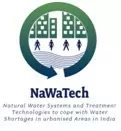
The project NaWaTech "Natural Water Systems and Treatment Technologies to cope with Water Shortages in Urbanised Areas in India" aims to explore, assess and enhance the potential of natural and compact technical water treatment systems, in order to improve their performance and reliability for the effective management of municipal water sources and to cope with water shortages in urban India. The specific objectives of NaWaTech are: (i) assess the technical, financial and environmental potential of natural and technical water treatment technologies to cope with water shortages in urbanised areas in India; (ii) enhance the natural and technical water treatment systems for the production of recycled water to supplement water sources considering extreme climatic conditions and highly varying pollutions loads; (iii) disseminate, exploit and ensure the take- up in practice and mainstreaming of NaWaTech activities and outputs by key stakeholders; (iv) benefit SMEs in the water sector by supporting the development of a local market for innovative water treatment technologies, and to train the SMEs on the NaWaTech approach; (v) establish foundations of a long-term cooperation between EU and India in water technologies.
An international team composed by 7 European partners, coordinated by the ttz-Bremerhaven and 7 Indian partners, coordinated by NEERI work on the adaptation of different natural and compact water systems to the Indian context during the 3 year lifetime of NaWaTech. NaWaTech was one of the 5 projects of the funding scheme shared by EU and India in the section "EU-India cooperation in water technology and managment: research and innovation", where EU partners were funded by the 7th Framework Programme (FP7). The project starded in 2012 and ended in 2015.
IRIDRA was involved as partner of the NaWaTech project. IRIDRA designed and disseminated results of different pilot systems, which were realized in India and wanted to reduce water shortage in urbanized Indian areas (constructed wetland and green walls for treatment and reuse of wastewater). Moreover, IRIDRA contributed in the organization of courses, aimed to tranfer knowledge to local stakeholders and designers. The courses were related to sustainable sanitation and sustainable water management.
Case study - Constructed wetland and sludge drying reed beds for treatment and reuse of wastewater produced by the ordnance factory of Ambajhari, Nagpur (India)
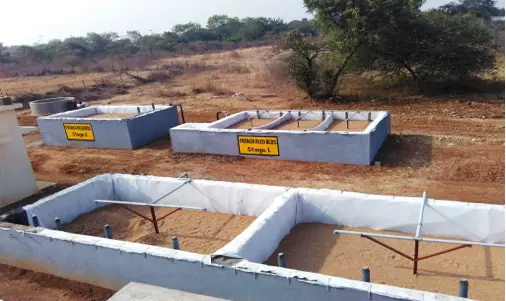
Areal view on the SDRB and FRB pilot for the ordnance factory of Ambajhari in Nagpur (India) before the plantation, designed by IRIDRA
Case study -Constructed wetland treatment plant in the urban Dayanand Park, Nagpur (India)
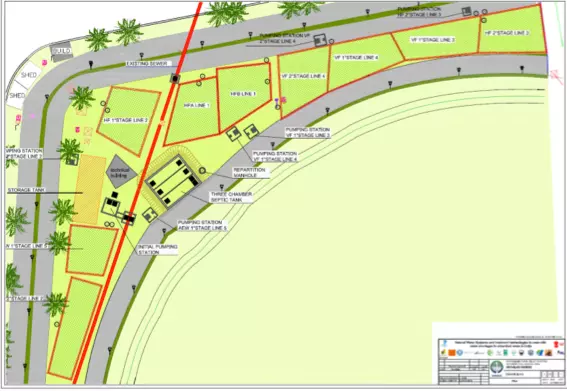
Planimetry of CW sited in the Dayanand Park, Nagpur (India), designed by IRIDRA
Case study - Constructed wetland for treatment and reuse of wastewater from the campus of College of Engineering of Pune (COEP), Pune (India)
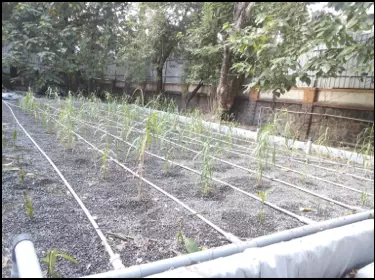
I
CW plant for the COEP campus, designed by IRIDRA
Case study - Green wall pilot plant for treatment and reuse of greywater from the Maharashtra Jeevan Pradhikaran (MJP), Pune (India)
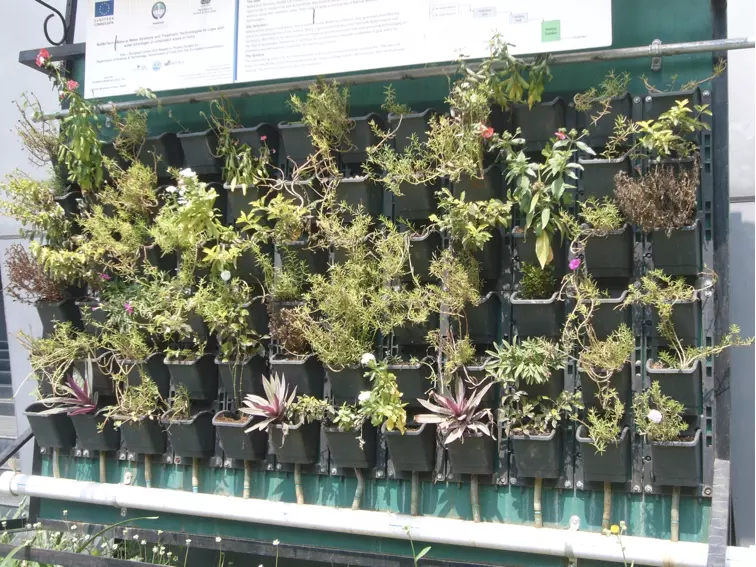
Pilot green wall sited in MJP, Pune (India), designed by IRIDRA
Courses - Organization of courses and lecturing to Indian professionals and SMEs on sustainable water management, Pune (India)
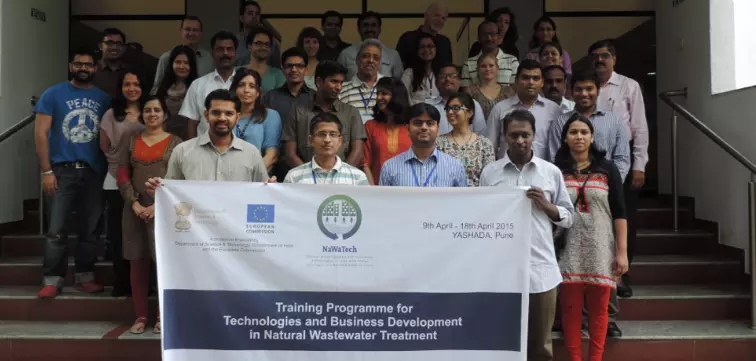
Participants of the three-day course in Pune (India), in April 2015, lecture by Dr. Fabio Masi of IRIDRA
Dissemination - Development of the NaWaKit in the toolbox Sustainable Sanitation and Water Management (SSWM)
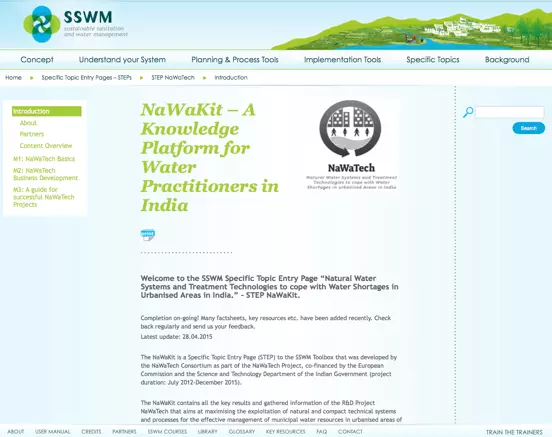
NaWaKit page on SSWM toolbox, which IRIDRA contributed in the development
For more details: https://sswm.info/
IRIDRA's publication on NaWaTech project
IRIDRA's authors are highlighted in bold.
- Pophali G.R., Sahu N., Khilnani A., Kaur H., Yadav S., Labhasetwar P.K., Bresciani R., Masi F., Meinhold K. Domestic Wastewater Treatment and Reuse in Ordnance Factory Ambajhari, Nagpur. Sustainable Sanitation Practice, 25, 01/2016, 12-16.
- Nicolics S., Hewitt D., Pophali G.R., Masi F., Panse D., Labhasetwar P.K., Meinhold K., Langergraber, G., Application of the NaWaTech Safety and O&M Planning Approach Re-Use Oriented Wastewater Treatment Lines at the Ordnance Factory Ambajhari, Nagpur, India, in "Natural and Constructed wetlands: Nutrients, heavy metal, energy cycling, and flow", Vymazal Jan (Ed.), Springer, 147-163; 978-3-319-38926-4, 2016.
- Masi F., Bresciani R., Winkelmeier P., Pophali G.R., Khilnani A., Sahu N., Kaur H., Labhasetwar P.K., Yadav S., Nagarnaik P. Wastewater Treatment and Reuse for Irrigation in an Urban Park: the Dayanand Park Treatment Wetland System in Nagpur. Sustainable Sanitation Practice, 25, 01/2016, 17-20.
- Patil S., Edathoot A., Patwardhan N., Bresciani R., Panse D., Masi F. Natural and Cost Effective Way of Treating Domestic Wastewater with Reuse in Non-Potable Purposes: The College of Engineering Pune (COEP) Hostel Campus Case Study. Sustainable Sanitation Practice, 25, 01/2016, 21-27.
- Masi F., Rizzo A., Bresciani R., Edathoot A., Patwardhan N., Panse D. Greywater Treatment and Reuse in a Municipal Office in Pune by Vertical Gardens. Sustainable Sanitation Practice, 25, 01/2016, 28-33.

